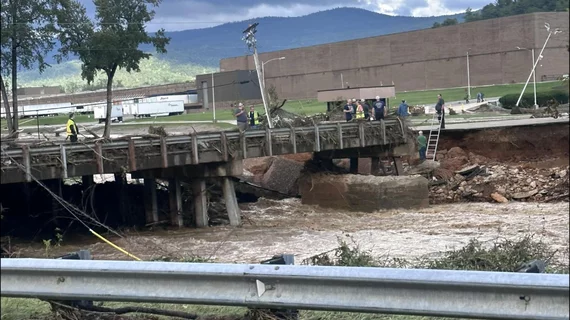Baxter producing IV solutions ahead of schedule at Asheville-area site
Baxter is producing IV solutions and drugs at a rate ahead of schedule after Hurricane Helene caused major damage to its facility in North Cove, North Carolina, just outside Asheville.
The company has restarted a manufacturing line at the plant, which accounts for roughly 25% of the site’s total output. The line primarily produces 1-liter IV solutions, the most commonly used size in healthcare settings.
IV bags and solutions will begin shipping in late November, ahead of the company’s original expectations.
“Recovery progress at our North Cove site continues to be very encouraging. In a matter of weeks, our team has advanced from the depths of Hurricane Helene’s impact to restarting our highest-throughput manufacturing line,” José E. Almeida, president and CEO at Baxter, said in a statement.
Almeida thanked employees and government emergency responders for their “steadfast support” in making progress ahead of schedule.
“This is a pivotal milestone, but more hard work remains as we strive to return the plant to full production,” Almeida added.
Baxter said it aims to return production to pre-Hurricane Helene levels by the end of the year, rolling out new lines in phases.
One of the primary challenges for the North Cove facility has been its isolation: Storm surge waters from Helene washed away the only bridge to the site. A temporary bridge has since been constructed, and Baxter said a second bridge will be operational in the coming weeks.ks.
Policy shift to address shortages
The North Cove site produces roughly 60% of the IV bags used in the U.S., and Baxter’s competitors have been unable to fill the gaps. In response to a growing national shortage, Baxter has been importing IV solutions from sites in Canada and overseas.
The Biden Administration invoked the wartime powers provision of the Defense Production Act to boost domestic production. However, even with ramped-up production and imports, shortages persist. The U.S. Food and Drug Administration (FDA) has listed nine IV fluids that are particularly short in supply, including dextrose, sodium chloride, sterile water, and dialysis fluids.
On Oct. 28, the FDA changed its policy regarding extended use dates for some parenteral drug products. Those drugs will be given new use dates to extend their shelf life. Only some IV solutions are eligible. A complete table of products and associated lot numbers can be found here.

